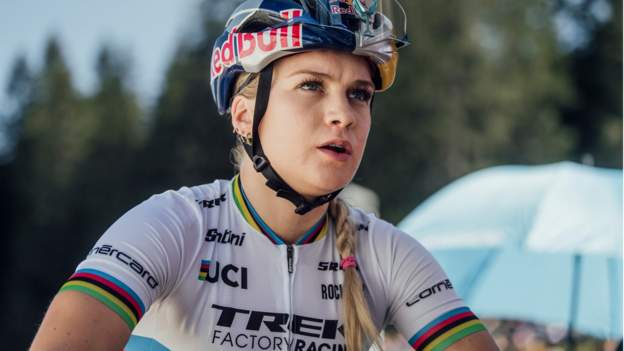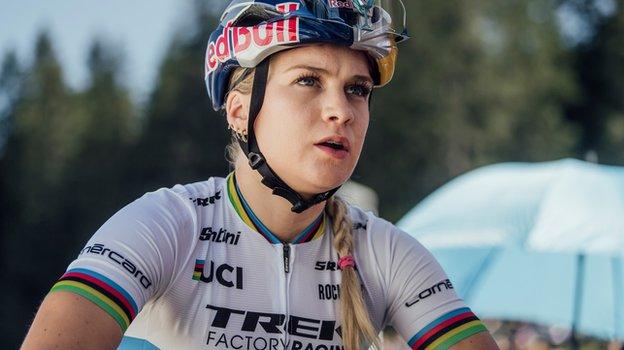
Evie Richards became Britain’s first elite women’s mountain bike cross-country world champion in 2021, and took gold for England in the same event at the Commonwealth Games earlier this month. She defends her world title at the UCI Mountain Bike World Championships in Les Gets, France, from 23-28 August.
I love my life as a mountain bike racer, it’s everything I dreamed of, but it’s taken a lot of work to get here.
It took me a long time to realise what makes me happy as a bike racer, and as ‘Evie’ – the person I am when I am away from my sport – but, since I worked that out, I’ve seen my life on and off the bike just get better and better.
I don’t think some of the issues I faced are focused on enough by anyone in professional sport, so I like to speak about them as much as I can.
After leaving school at 16 to join the British Cycling Academy and focus on becoming a professional rider, my periods stopped. In the following five years I only had three menstrual cycles, because I was over-training and not eating properly or enough.
When I spoke to doctors I was told that losing your period was very common as a professional female athlete, and it was nothing out of the norm or something to worry about.
I know now that it shouldn’t be happening, and Red-S [a condition called Relative Energy Deficiency in Sport that affects men and women] isn’t a sign that you’re going about being a professional athlete the right way.
Looking back, I can see that as a young athlete it’s drilled into you that if you want to reach elite level, you have to make sacrifices – like cutting back on your social life, or working extra hard to control your weight to be as light as possible to go as fast as you can.
At the time I assumed it was just the choice I had to make but, at 25, I know differently. When I joined the British Cycling Academy I stopped seeing so much of my friends and family and cut back on the food I was eating, then dedicated every hour of my day to training. I thought that was what you did to go fast and win.
I think things have got much better now and the advice about what it means or takes to be an athlete has got so much more realistic, but I still think the wrong messages – or maybe even a lack of information – are being sent out to young girls who are thinking about getting into riding.
When people contact me on social media, asking for advice about how their children can ride faster, I just tell them to enjoy themselves and ride because they want to.
The rest will come from there and, at a young age, you really don’t need to be focusing only on getting faster.
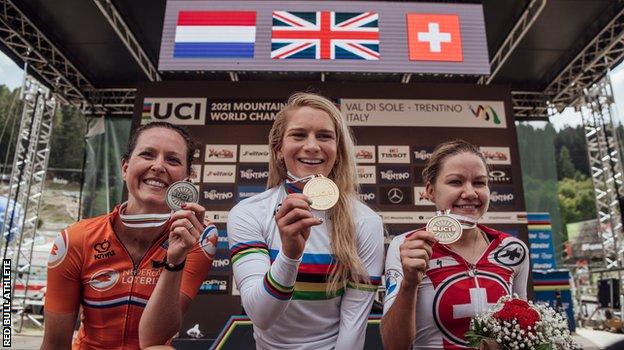
‘The Olympics were always a fixation of mine’
I’ve always had a desire and drive to succeed – I wanted to be an elite athlete since I was about six.
But that meant I always put pressure on myself too. My family love the Olympics so much we planned holidays so we could all watch it together. I remember being so competitive when I was younger that I couldn’t even watch some events because I wanted so much to be there, taking part.
The Olympics were always a fixation of mine so when I went to high school and there was a corridor filled with the framed jerseys of pupils who had represented their country at sport, I knew what I wanted to do.
Every day I would walk down that corridor and think, by the time I finish school, my jersey has got to be on that wall – I am going to do everything I can to make that happen. I saw it as the first stepping stone of getting to the Olympics.
I tried every sport… hockey, basketball, even rounders, and did pretty well – I reached county level at most of them – but I never stopped thinking about the Olympics, and what would take me there. Cycling was actually the last thing I tried.
‘I felt like I wanted to do this forever’
I’d started playing hockey at 11 when I started high school. By the time I was 15, I was on the cusp of the England squad, and then my coach said I should pick up another sport over winter for fitness.
My dad had just started a cycle to work scheme, so he had a new bike and we would go out together, taking turns to run and then ride.
That just gave me a glimpse of the freedom you get from cycling. I bought my own bike shortly after that so I could use it to get to work and then Dad entered me into a few races.
Suddenly I jumped into a different league. I went to an inter-regional race and led it out, when no-one knew who I was. I had to push the bike down all the technical parts of the course because I was horrendous at riding them, but I still won.
From there it felt like it was a whirlwind. I got selected for the British Cycling Academy in Manchester and, when I first went to the big races with the British team, I just fell in love with the sport.
I remember being 16 in Norway at my first World Championships with a whole support team and thinking my life was incredible. I just wanted to do this forever.
‘I trained even harder but that just made things worse’
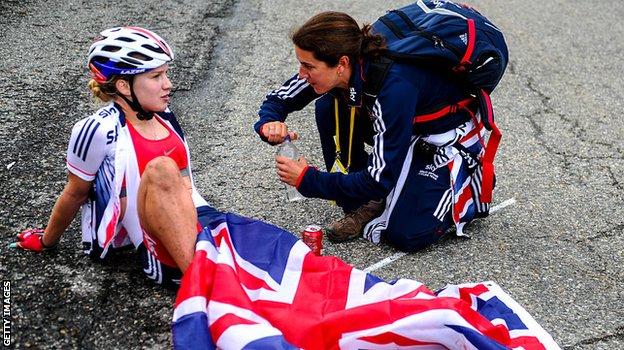
After I moved to Manchester and joined the Academy, that feeling changed.
I was obsessed with riding and winning, but at the same time I lost any enjoyment from getting on my bike.
I think it’s important to talk about that now, because I don’t want young riders going through what I did – it was truly horrid.
I always put so much pressure on myself to succeed because I did not like losing and felt embarrassed if I didn’t do well.
I would think about how I’d given up time at home, and seeing my friends to move away to become a professional rider, and if I didn’t win I hadn’t achieved that.
My thinking was, that I couldn’t have friends, because time spent with them and away from my bike and training in Manchester would hold me back. But because I stopped having fun in my personal life, it affected me on the bike too.
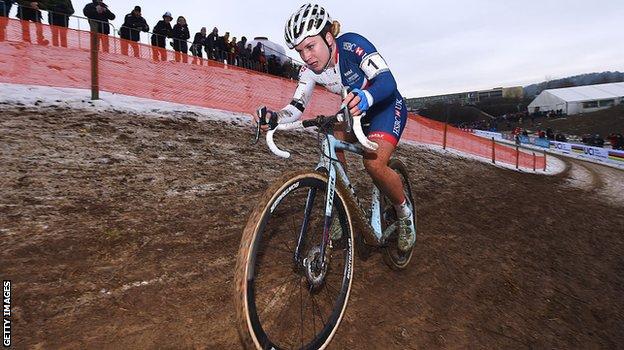
My anxiety about getting the results I wanted meant I would be physically sick before races, and during them. There were lots of times where I didn’t even finish because I got myself so ill.
That just made me even more worried about racing, because it felt like I had cut off my social life and achieved almost nothing from it.
The only way I could see things getting better was if I trained even harder, but that just made things worse.
‘My mum said I looked like a bag of bones’
I look back at the diary I kept when I was in Manchester and I was obsessed about my weight.
No-one ever told me that was unhealthy, apart from my mum – I remember one time when I came home having won silver at the 2018 Commonwealth Games in Australia and she just said I looked like a bag of bones.
For that to be seen as a bad thing went against everything I’d heard and seen when I was getting into sport, when it felt like the female athletes I was watching were basically promoting not eating anything.
As a young athlete I’d look at them and think, ‘right, they are my role models and that is what I need to do to be like them’.
I was always told I wasn’t built to be a climber, and thought people were probably right – but that just made me more competitive and obsessed with my weight to ensure I would be seen as being ‘small’ enough.
That only stopped when I began putting work into changing my mindset, and my fuelling. When I became world champion, I showed everyone that I don’t need to be thin to be fast up the hills.
Things are much better in all sports now, with more athletes and nutritionists speaking out about refuelling properly and staying healthy, but the obsession with weight has not totally gone away.
I see some of the athletes I race against posting their weights on social media and it makes me angry because it is literally breaking some young girl’s heart – she will see that and chase after being that thin on the scales, like I did.
It’s not right at all. Eating disorders are such scary things for all girls that I believe, as athletes, we should be showing them a good example, and telling them that they do have to fuel themselves properly.
I want to see lots of girls start cycling but more importantly I want lots of happy athletes and it doesn’t help when you see some people racing who look so ill. You race better when you’re happy and healthy.
‘I started riding for fun again’
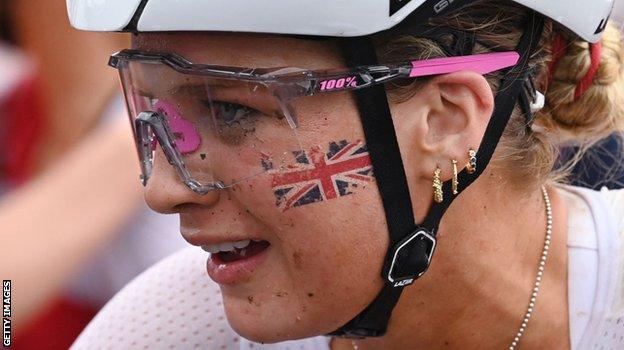
What changed for me was finally getting the right support and advice, from people who understood my body and my mindset.
About four years ago, I started working with my psychologist, Rich Hampson, and he brought back that kid in me who just wanted to ride their bike for fun.
We realised that the only time I wasn’t sick at races was when I was racing cyclo-cross, because that was the discipline where I didn’t put any pressure on myself, and the one that reminded me the most of riding back at home in Malvern when I was little and falling in love with the sport. I’ve not been sick before a race since.
I also began seeing a nutritionist, Renee McGregor, and my periods have started again now. When they stopped, my first reaction had been ‘that’s great – it’s less of an inconvenience when you are racing’. But now I know much more about my body, and how bad it is not to have your period – and how, by staying healthy, you’ll get the best out of yourself.
I basically feel like a different person to those early days. I still train hard but I also have a life and I am happy. I’ve got more chilled as I’ve got older, because I have learned how to balance everything.
My main target in 2021 was always the Tokyo Olympics – yes, I did make it to a Games! – where I finished seventh, but the work I put in for Japan really paid off a few weeks later at the World Championships.
Winning that world title last August was a dream come true but, annoyingly, instead of trying to shine in my rainbow jersey, I have spent most of 2022 in agony with an injury that felt like someone was sticking knives into my lower back.
I went a few weeks without competing because of that back injury and only returned earlier this month for the Commonwealth Games, which felt like it was on home ground. It was my first race this year with no pain and no tears… and I won, in front of all my friends and family, which felt very special.
I’m in a better place to handle injuries and anything else now. I’m back living close to where I grew up, riding where I used to with my dad and the boys from my village.
I love it and if you are enjoying what you do life is so much better, and your race results are too.
Then, when you achieve something, it feels so much more special because all the people that you love have helped you achieve that as well.
Evie Richards was speaking to BBC Sport’s Chris Bevan.
If you have been affected by the issues raised in this article, help and support is available via BBC Action Line.
